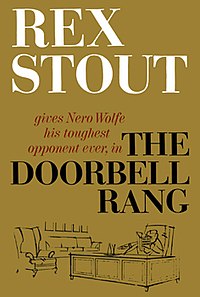
When I first wrote a short review of this book back in 2010, I noted how bleak and black-and-white it appeared. By black-and-white, I don't mean "lacking nuance" or "straightforward," but rather, I visualized it, then, as feeling like it was coming from the same white-hot, intense, paranoid land of TV's Naked City, The Fugitive and Route 66. These programs were all capable of light - the phenomenally bleak Route 66 even indulged in outright whimsy at least twice - but adult drama on television, particularly in the wake of Kennedy's assassination, picked up a really harsh undercurrent. The Fugitive's very premise is that the American criminal justice system has completely failed.
As I'm rereading Rex Stout, however, my wife and I are approaching it a little differently. When I first read the canon in 2009-2010, it was almost totally fresh, with only three of the television adaptations starring Maury Chaykin and Timothy Hutton preceding my reading, and those by months. Their visual influence over my reading had long faded by the time I got this deep into the series. This time out, I bought the box set of DVDs, and after reading each story or novel that was adapted, my wife and I sat down and watched the TV version.
The effect, over time, has been downright weird. Since most of the guest roles are taken by members of a loose repertory company, I found myself visualizing the settings, and casting, in my mind's eye, all of the speaking parts from the same crowd of nine or ten faces. When we came to a story that was adapted, I punched the air whenever that episode's casting director and I employed the same artist. And, after weeks of familiarity with the settings, the musical cues, and the house directorial style, rereading The Doorbell Rang had an entirely different, and much more colorful effect on me.
It is still, assuredly, an angry and contemptuous novel. Stout, inspired by Fred J. Cook's expose The FBI Nobody Knows, was incensed by what he saw as that agency's overreach, and crafted a labyrinthine gem of a novel where Nero Wolfe can just punch that agency in the nose and kick its defenders when they're down. The casual, albeit angry, acceptance among the players that they are being followed and their phones tapped is revelatory. Under Hoover, the FBI had grown too powerful, and influential people like Stout were justifiably furious. The right wing, then, could not imagine the government acting in such an intrusive and impossible way - it was, then, those subversives on the left who were undermining trust in a government that would never put regular Americans on unjustified surveillance. Say what you will about Ronald Reagan, the man certainly turned things completely on their head, didn't he?
The book's coda is one last bit of kicking, and it is completely brilliant. Not content with spending two hundred pages making the FBI into the villains - well, to be fair, there is a murderer at large here not employed by that agency - Stout engages in one last twist of the knife, a direct, blunt, personal and beautiful kiss-off to J. Edgar Hoover himself. I love it to pieces, even if, under the influence of the TV series, this previously stark and black-and-white narrative became musical and colorful in my rereading.
One last note about the TV series. Another adaptation, of The Mother Hunt, is, curiously, credited as being directed by Alan Smithee, the standard guild-approved pseudonym. It is usually deployed to cover a displeased director, or work finished outside their control, leading some viewers to suspect some behind-the-scenes unhappiness from an unfamiliar director, unused to the program's house style. It certainly doesn't bear the standard look and feel of the other episodes. Interestingly, among the cast, easily the most recognizable actor is Carrie Fisher, who has an incredibly small part, and whom you wouldn't think would have much need to trek off to central Ontario on what looks like an awfully cold shoot, for a single day's filming and all of maybe four lines. I wonder what director could have encouraged Fisher to join the production. Perhaps it was actually, in fact, Fisher herself? Just a theory, of course.
No comments:
Post a Comment